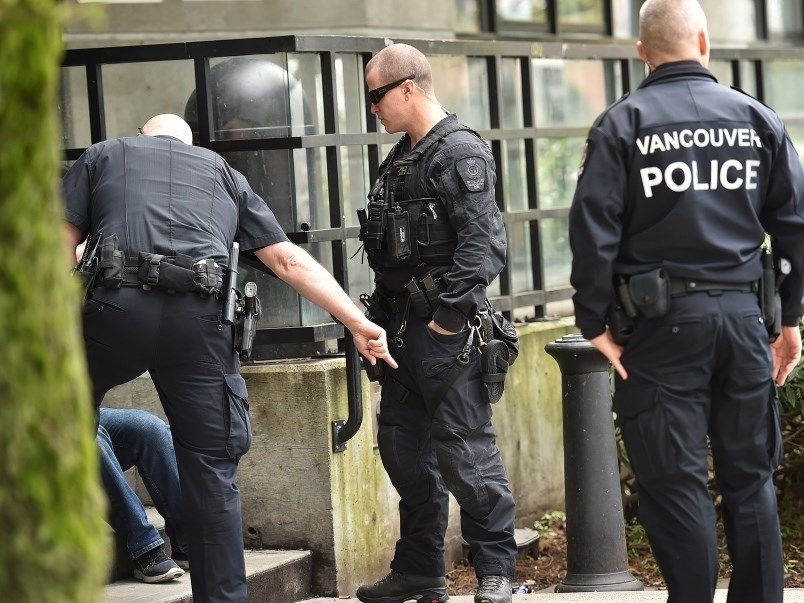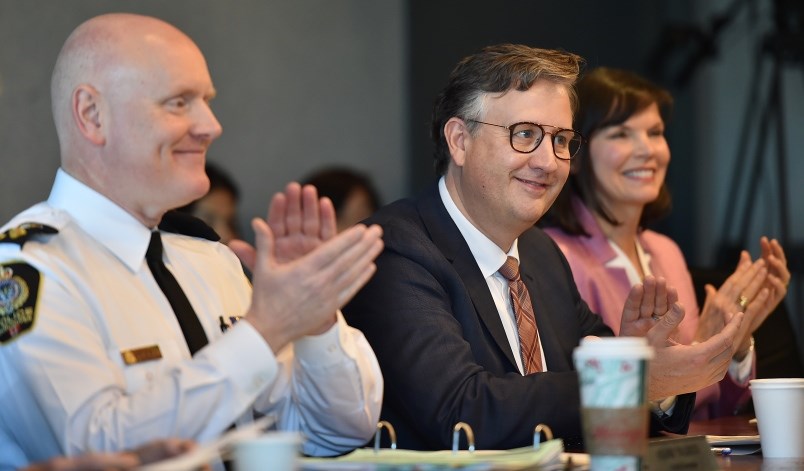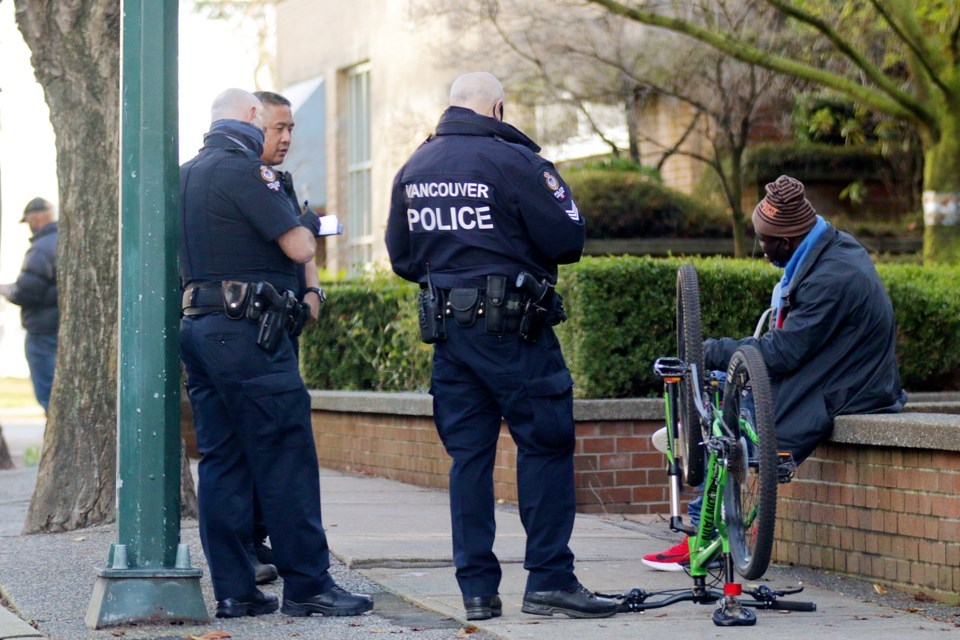The Union of B.C. Indian Chiefs, the B.C. Civil Liberties Association, Hogan’s Alley Society and the WISH Drop-in Centre Society released a statement Wednesday that argued police officers have no lawful authority to conduct street checks.
The statement was in response to an audit the VPD conducted last year on street checks. The audit report, which showed a substantial decrease in street checks from 2019 to 2020, was presented Thursday to the Vancouver Police Board.
“The VPD’s first annual audit of street checks normalizes the practice of street checks,” the coalition said.
“The issue is not whether there are 10 street checks or 10,000 street checks – the issue remains that there is no legal basis for street checks. Even according to the audit, street checks continue to disproportionately harm Indigenous and Black communities.”
As Glacier Media reported Tuesday, police said they conducted 75 street checks in 2020.
Data for the period Jan. 15 to Dec. 31, 2020 shows the 75 checks involved 87 people across all four policing districts, including 20 on Indigenous people and two on Black people. Indigenous people make up just over two per cent of the population in Vancouver, and Black people less than one per cent.
Eleven of the checks on Indigenous people stemmed from an officer’s concern about a person’s well-being or safety, according to the report, which said the majority of the 75 checks were conducted for a public safety reason.
 A VPD audit in 2020 found that 87 per cent of people police questioned in a street check were suspects in an average of 19.5 different criminal investigations prior to the check. File photo Dan Toulgoet
A VPD audit in 2020 found that 87 per cent of people police questioned in a street check were suspects in an average of 19.5 different criminal investigations prior to the check. File photo Dan ToulgoetThe report said police use the checks to make enquiries into “reasonable and legitimate” public safety concerns such as suspicious activity, crime prevention or intelligence gathering. Police have said street checks helped solved crimes, including robberies and homicides.
“Eighty-seven percent of the people in the 75 proactive street checks were a suspect in an average of 19.5 different criminal investigations prior to the street check,” the report said.
Other people checked last year included 49 Caucasians, seven South Asians, seven Asians, one Middle Eastern and one Hispanic. Of the 87 people questioned by officers, 68 were men and 19 female.
Lama Mugabo, director of Hogan’s Alley Society, questioned the reliability of the data and reports produced by the VPD and another commissioned by the police board, arguing there is no evidence street checks are valuable.
“The studies also ridiculously suggest that there is no racism in street checks, even though all the data and our experiences are clear that street checks are harmful for Black, Indigenous and low-income communities,” Mugabo said in the statement.
Sex workers targeted
Mebrat Beyene, executive director of WISH Drop-In Centre Society, said street-based sex workers continue to report being targeted by police for street checks.
“Street checks are, by their very nature, arbitrary because they are outside of an actual investigation and create a climate of criminalization and harassment for sex workers,” Beyene said in the statement.
“Street-based sex workers report being followed, stopped, and questioned by police officers, which can push the trade further underground and jeopardize sex worker safety.”
At the police board meeting Thursday, Deputy Chief Howard Chow said street checks are legal, are not banned anywhere else in Canada and that they play an important role in public safety.
At the same time, Chow said he wanted to acknowledge “the racist and prejudicial path and history that we’ve all been part of, and I know that it’s clearly left certain demographics, including the Indigenous community, disadvantaged.”
The board’s vice-chairperson, Barj Dhahan, requested the board’s executive director invite the Union of B.C. Indian Chiefs and the B.C. Civil Liberties Association to meet over the next couple of weeks to discuss the audit.
 Vancouver city council was unanimous in July 2020 in supporting a motion from Mayor Kennedy Stewart (pictured with Police Chief Adam Palmer) to ban police street checks in Vancouver. File photo Dan Toulgoet
Vancouver city council was unanimous in July 2020 in supporting a motion from Mayor Kennedy Stewart (pictured with Police Chief Adam Palmer) to ban police street checks in Vancouver. File photo Dan ToulgoetMayor Kennedy Stewart, who doubles as chairperson of the police board, suggested other groups also be invited, including members of local First Nations.
Vancouver city council was unanimous in a vote last July to call for a ban on street checks but there was no discussion by the mayor or board members Thursday related to the request.
The issue of street checks first arose in Vancouver when VPD posted data to its website in 2018 that showed police conducted 97,281 street checks between 2008 and 2017.
Of those checks, 15 per cent (14,536) were of Indigenous people and more than four per cent (4,365) of Black people. The B.C. Civil Liberties Association and the Union of B.C. Indian Chiefs said the data suggested the practice was discriminatory and should be banned.
Since then, police have conducted a review, an audit and commissioned a report on street checks, with the conclusion reached from each exercise being that the practice is not discriminatory.
'End this charade'
Those conclusions have incensed Chief Don Tom, the vice-president of the Union of B.C. Indian Chiefs, who pointed out the police board-commissioned study conducted by Pyxis Consulting Group Inc. failed to publish allegations of two officers making racist and inappropriate comments about vulnerable and marginalized people during research on street checks.
“Vancouver Police Board needs to end this charade and stop normalizing street checks,” said Tom in an interview prior to the board meeting.“This is disproportionately impacting Indigenous people’s lives and persons of colour in Vancouver. It’s time they stop this.”
In December, B.C. director of police services appointed former B.C. information and privacy commissioner David Loukidelis to conduct a review of the Pyxis study.
Loukidelis’ appointment came after B.C. Complaint Commissioner Clayton Pecknold recommended an analysis of the findings, conclusions and methodology of Pyxis, which is owned and operated by Ruth Montgomery, a former Edmonton police superintendent.
@Howellings



